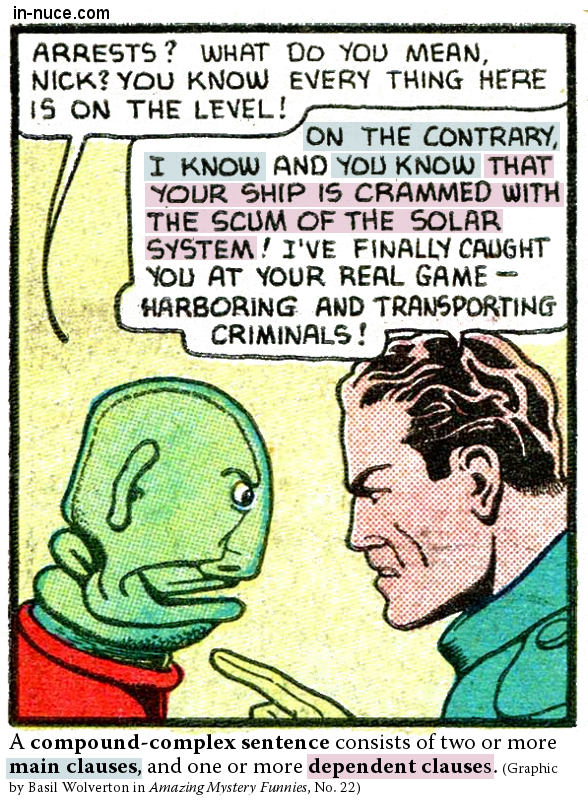Compound-complex sentences
From A New English Grammar for Schools, by Thomas Harvey:
1. I will go when the spring comes, but I will return soon.
How many principal propositions are there in this sentence?
Two: “I will go when the spring comes” and “I will return soon.”
Which of them is a complex proposition?
“I will go when the spring comes”
(main clause) (dependent clause)
Which is simple?
“I will return soon.”
(main clause)
This sentence contains a complex proposition that consists of two clauses: one dependent clause within a main clause, and one simple proposition (main clause).
Therefore, this is a compound-complex sentence.
2. The train which we had desired to take had started, and we were left behind.
How many principal propositions are there in this sentence?
Two: “The train which we had desired to take had started”
and “we were left behind”
One is a complex proposition:
“The train which we had desired to take had started”
(main clause a) (dependent clause) (main clause b)
One is simple:
“we were left behind”
(main clause)
This sentence consists of two or more main clauses and one or more dependent clauses, therefore it is a compound-complex sentence.
3. The simple or complex propositions of which compound-complex sentences are composed are called members.
They are numbered according to their place in the sentence.
Ex. — “The rain fell in torrents, and the river, which received it, became swollen.” In this sentence, “The rail fell in torrents” is the first member, and “the river, which received it, became swollen” is the second member.
Exercise:
Analyze each of the following sentences.
Model: The rain fell in torrents, and the river, which received it, became swollen.
This is a compound sentence with two members. The first member is the simple proposition, “The rain fell in torrents,” and the second member is the complex proposition, “the river, which received it, became swollen.” The main clause in the second member is “the river became swollen,” and the dependent clause is “which received it.”
1. We ran to the station when the whistle blew, but we were too late.
2. She entered the room, or I thought that she did.
3. The wind blew a gale, the rain fell in torrents, and the pupils could not go home when school was over.
5. The boys played games, then the girls recited some poems, and finally the teacher read to us until the rain ceased.
6. The invitation came on Monday, on Tuesday we accepted, and on Wednesday the picnic occurred.

